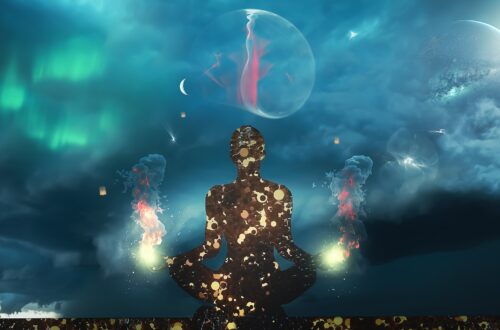
Our Lived Life
Should we base our life on abstract ideas, or should our “lived life” dictate those abstract ideas?
Off the cuff, many of us say, of course, our lived life should dictate those ideas. It makes sense. Many people come up with their first ideas about life from their life experiences. But what often happens is once we get those ideas in our head, we reject any ideas that conflict with them.
The Modern View
Our modern world embraces the former view that our life should conform to our ideas. For example, scientists initially discover new ideas from experiments but become so invested in them that they refuse to question them. It’s one of the reasons they reject any talk of intangible topics like God, consciousness, mind, soul, etc. From its dualistic perspective of a separate mind and body, the modern view privileges its mental framework over our lived experience.
In other words, once we develop our ideas about the world, we must fit our lived experiences into those ideas.
This can cause a lot of problems. For one thing, our fixed ideas, by definition, won’t change while the world outside of us and in us is constantly changing. So how can something constantly changing interact with something that doesn’t change? It is a problem that confronts all dualists like Plato and Descartes.
The Phenomenological View
However, phenomenologists like German philosopher Edmund Husserl and French philosopher Maurice Merleau-Ponty saw the need to change the paradigm from a separate mind and body to an integrated mind and body. Merleau-Ponty explains,
“There is not a duality of substances but only the dialectic of living beings in its biological milieu.”
Philosopher John Chaffee, in his book, The Philosopher’s Way, expands on this,
“In other words, our ‘living body’ is a natural synthesis of mind and biology, and any attempts to divide them into separate entities are artificial and nonsensical.”
Phenomenology tells us that all knowledge of ourselves and our world is based on the “phenomena of experience.” In other words, Husserl saw the division of mind and body as the result of confused thinking.
Instead, he claimed that in our lived life, we experience ourselves as a unity where our mind and body are seamlessly woven together. That is our lived experience of ourselves. In our everyday lives, the issue of a separate mind and body melts into insignificance.
Chaffee adds,
“The underlying question is ‘What aspect of our experience is the most ‘real’? From Husserl and Merleau-Ponty’s vantage point, it’s the moments of immediate, pre-reflective experience that are the most real. It is the Lebenswelt or ‘lived world,’ which is the fundamental ground of our being and consciousness.”
An Example
For example, when I wake up in the morning and start to plan my day, I think of all the things I have to do, like showering, eating breakfast, driving to work, having meetings, and so on, I don’t view these activities as my mind dragging my body around like a piece of luggage, but instead, I consider myself completing all these activities as an integrated mind and body.
That is my lived experience, and my lived experience is not dualistic.
So, in the above question, I asked whether we should base our life on our ideas or should our ideas be based on our lived life. Husserl and Merleau-Ponty chose the latter. We should base our thoughts on our lived life.
In other words, my lived experience is that of a unified mind and body. I only get the notion of a separate mind and body if I stop to reflect on my experience. But my direct experience of my lived life is as a unified being. Husserl and Merleau-Ponty view our lived life as primary, and our thoughts about our lived life as secondary. It’s important to remember the order.
The Love Example
Let’s use love as an example. Should we base our ideas about love on our lived experience, or should our lived experience of love be grounded on our notions about love? I know many would probably say both, and that is true, but which one is primary, and which one is secondary?
If we go into a love relationship with many preconceived ideas, we could create many problems. In a love relationship, we may think our partner ought to do this and that, and when they don’t, we assume they don’t love us.
That’s a narrow view of love. There is nothing wrong with having preconceived ideas about a love relationship that we may have picked up from books, friends, parents, and even our past experiences. But we can’t cling to them. Every relationship is different. We are constantly changing.
We must be open to different expressions of love that might fall outside our mental framework and be open to the possibility that our partner has their unique ways of expressing love. Our expression of love may also take on different forms in different relationships.
When this happens, and we let these new experiences infiltrate our ideas about love, we expand ourselves and our definition of love. We become more flexible and our relationship more expansive.
Lived Life is Primary, Ideas About it, Secondary
This openness is the point Husserl and Merleau-Ponty are making. We must base our ideas on our lived experience rather than the other way around. Living the other way can cause many problems in our life, causing us to become rigid and unchanging, cutting us off from experiencing the richness of life.
Let’s look at another example. In sports, when playing at our best, we are playing as a unified mind and body. When we overthink while playing, we lose that “flow” feeling and make mistakes. When we are at our best, or “in the zone,” we function as a unity. Likewise, when living at our fullest, we also function as a unity.
After the game, we may analyze our game as a separate mind exploring our play during the game. Nothing is wrong with that as long as we constantly test new strategies in our playing. Life is the same. We must always try out our ideas in our life experience and see how they fit.
Allowing our lived life to take center stage means we must let go of all our preconceived ideas and live freely and creatively. That can be frightening to a lot of us. We are afraid to relinquish our preconceived notions and live openly and spontaneously. Those mental frameworks have become so ingrained in us that they define us, so questioning them can threaten our self-identity.
Summing Up
However, if we can face and overcome these fears, we can learn to experience the excitement of living in the now, free of attachments. Instead of imposing preconceived ideas on every situation, we let the moment dictate our actions. We live much more spontaneously and freely.
So, the next time your life gives you problems, causing lots of frustration, stop and see if your ideas about your situation might be false. Are you clinging to ideas that are no longer valid if they ever were?
Life’s hard knocks are there for a reason. They are springboards, forcing us to reexamine our fixed ideas. Maybe they need changing. When we get a new perspective that matches the realities of our situation, then the pieces of our life will start coming together again.
To learn more about the Intelligence and Magic of the Universe: Click this link: The Magical Universe




